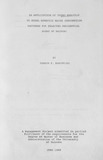| dc.contributor.author | Kanywuiro, Samson K | |
| dc.date.accessioned | 2013-06-26T06:41:36Z | |
| dc.date.available | 2013-06-26T06:41:36Z | |
| dc.date.issued | 1988 | |
| dc.identifier.citation | Master of Business Administration | en |
| dc.identifier.uri | http://erepository.uonbi.ac.ke:8080/xmlui/handle/123456789/40110 | |
| dc.description.abstract | The City residents rely on the Nairobi City
Commission for the provision of essential services of
which water supply is very important. Provision
of such an urban service is very challenging
especially with the current population growth rate.
Continued provision of water is only possible if
adequate revenue is generated from water sales to
cover capital, operation and maintenance costs.
Collection of revenue from water sales has been a
perpetual problem to the Nairobi City Commission.
The major problem in this case is attributable to the
delay in reading the water meters, an exercise that
has had to be done before billing the consumers. The
result has been the delay in billing the consumers
promptly and therefore lack of proper enforcememnt
for payment.
It has been suggested in the past that the meter
reading frequency should be reduced in the case of
some domestic water consumers but bill them monthly
from consumption estimates. It was the aim of the
study therefore to establish whether the past average
household water consum~tion followed a predictable
pattern which could form the basis of billing the
consumers in the same residential areas.
It was found from the study that the average
- vii -
water consumption followed a predictable pattern
which could form a base of billing consumers in
those residential areas where the monthly water
consumption does not vary much between households.
These residential areas are populous and a lot of
time is spent in reading the water meters. Monthly
water billing with suitable meter reading intervals
would be advantageous to the Nairobi City Commission
in very many aspects of which the improvement in
revenue receipts is a major one. | en |
| dc.language.iso | en | en |
| dc.title | An application of trend analysis to model domestic water consumption patterns for selected residential areas of Nairobi | en |
| dc.type | Thesis | en |
| local.publisher | School of Business, University of Nairobi | en |

